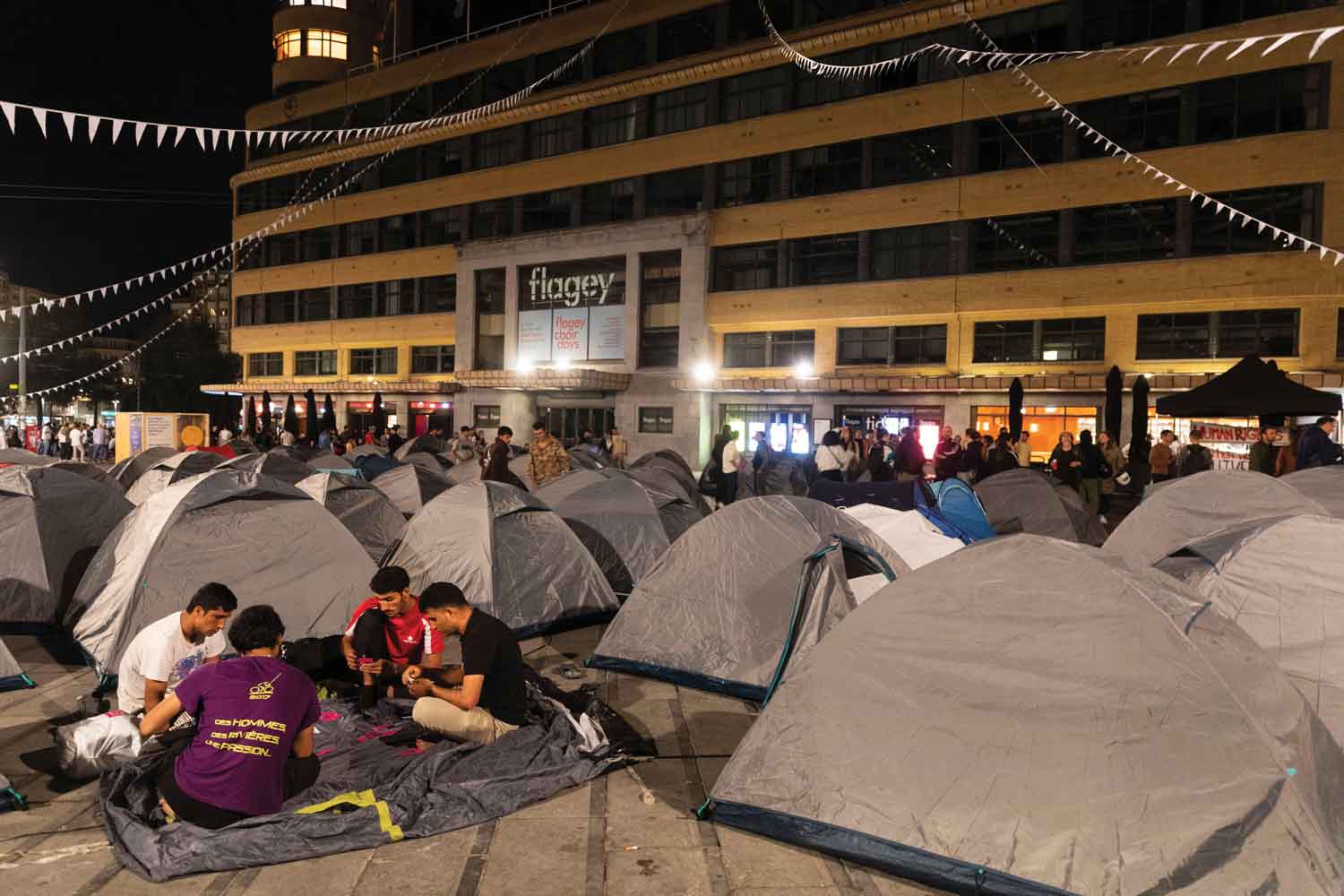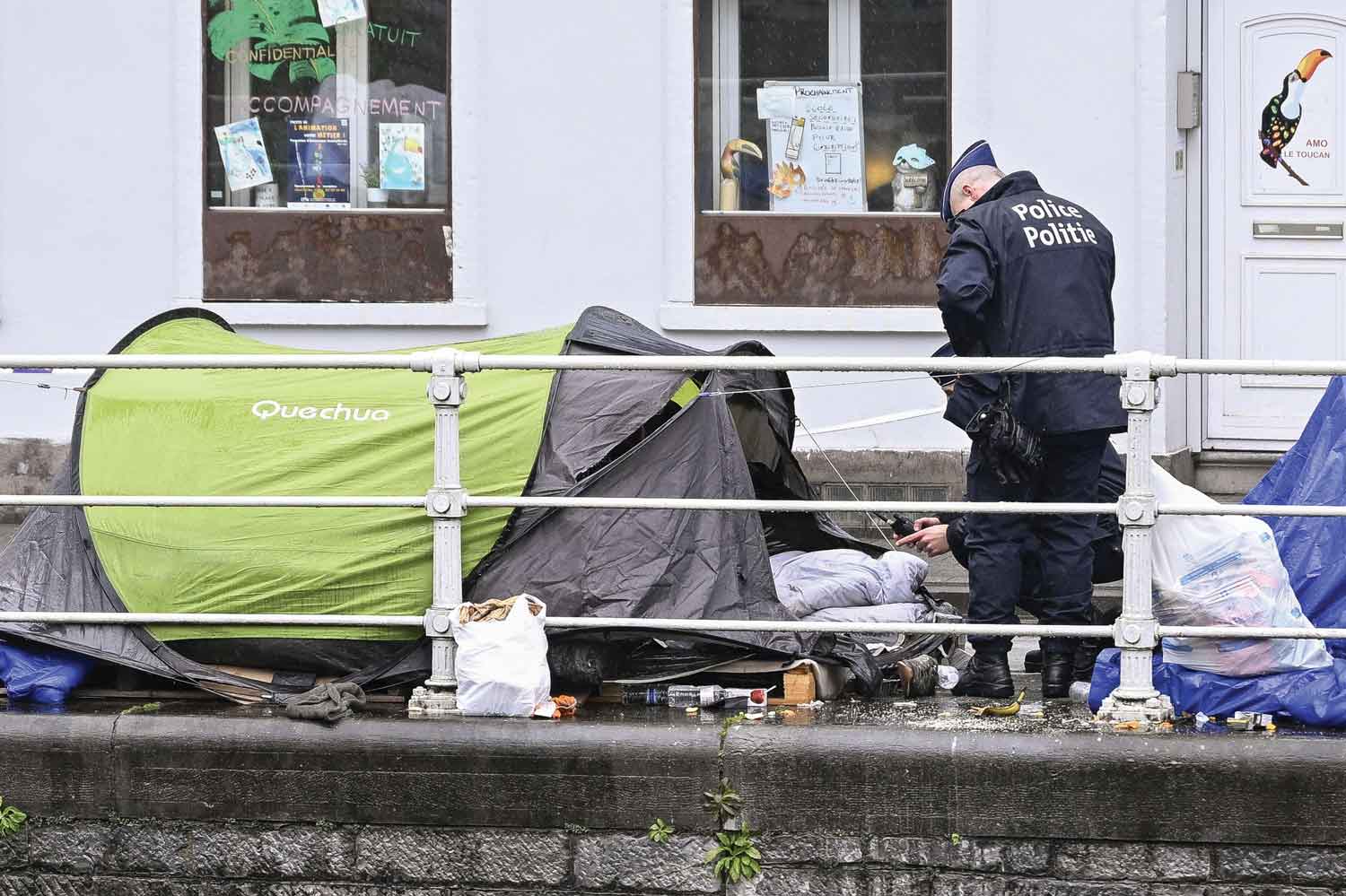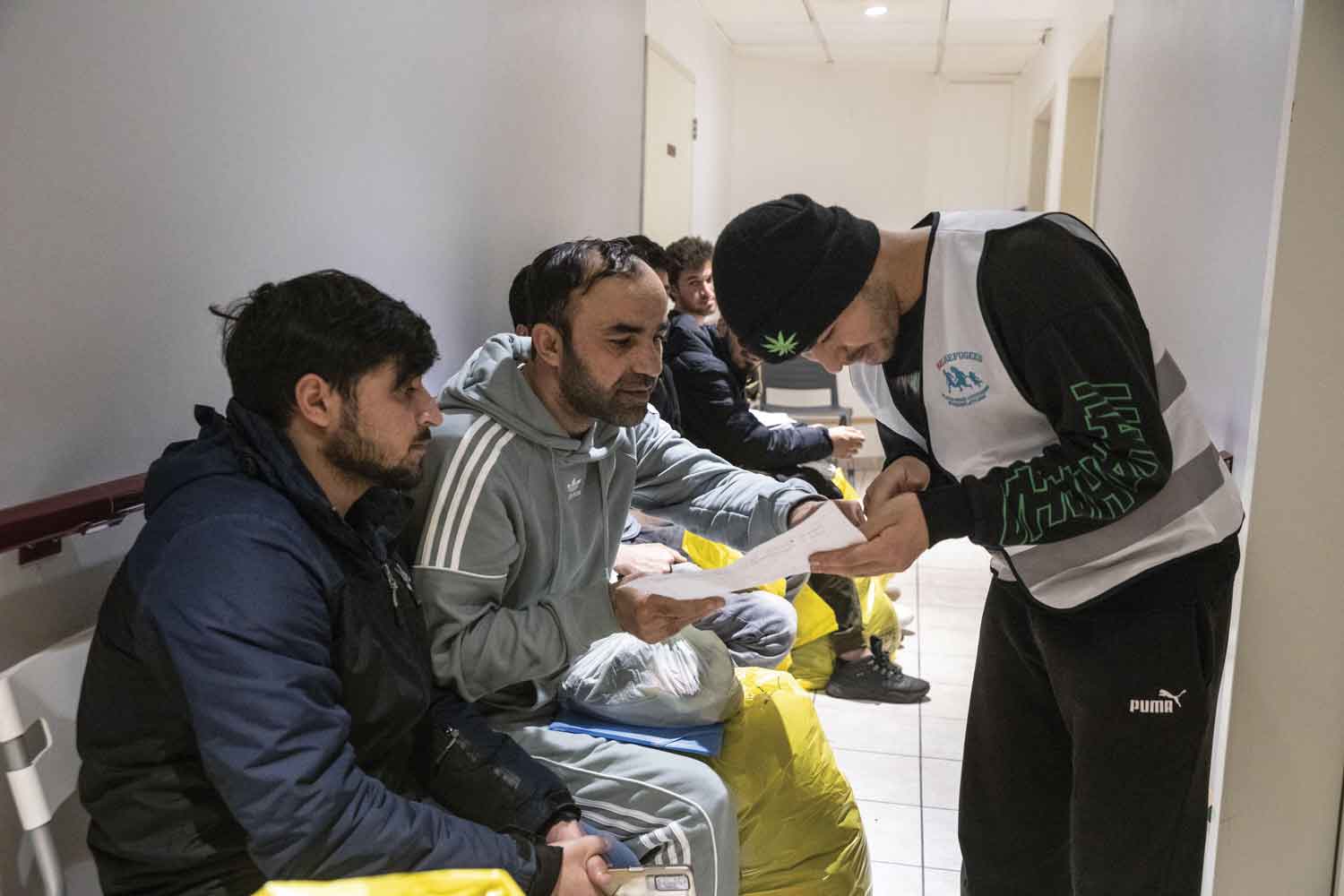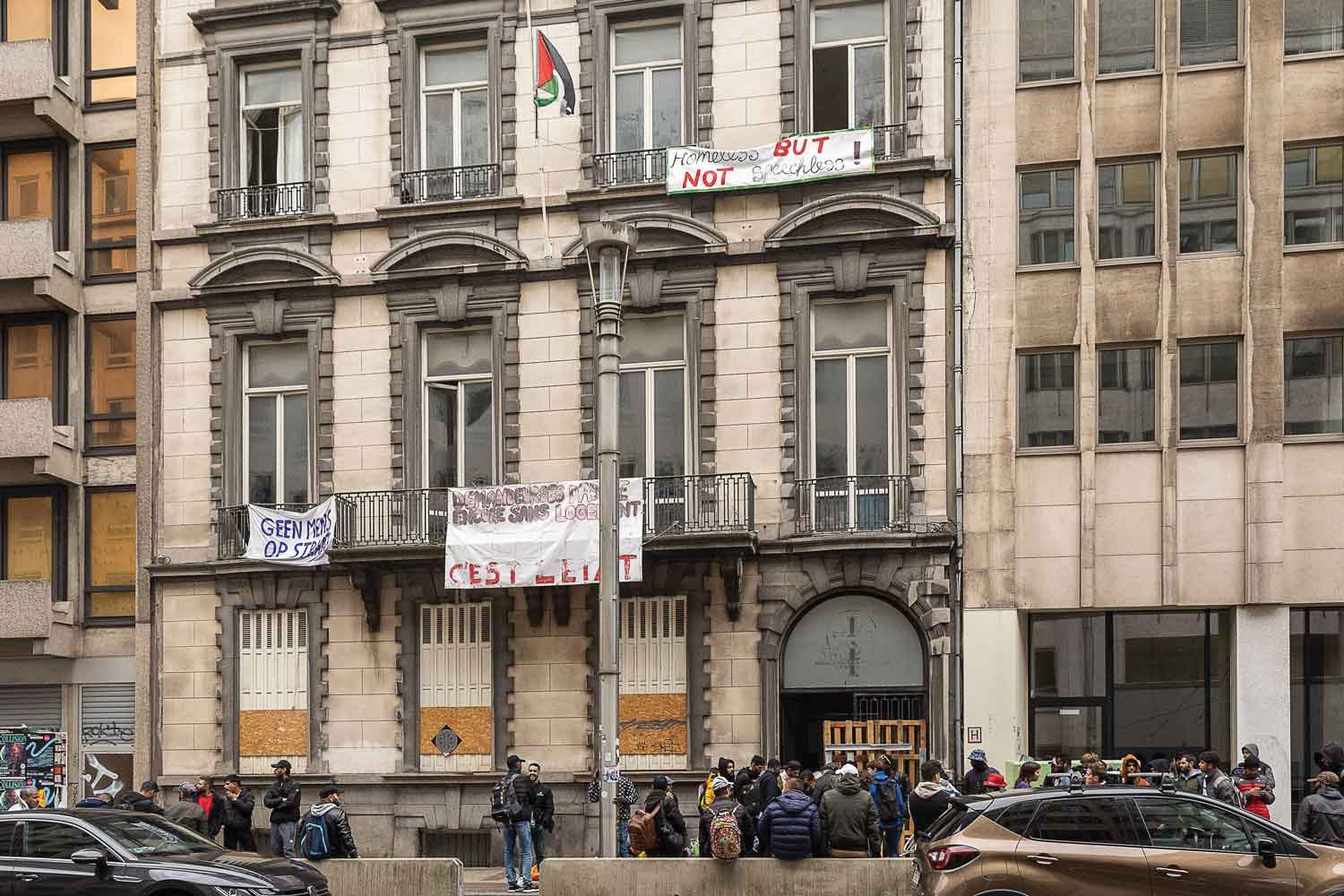In Rue de la Loi, a multi-lane street cutting through Brussels’ European quarter hosting the European Union institutions, a large banner adorns the facade of a run-down building: “Demandeurs d’asile sans logement – le seul coupable est l’état” (Asylum seekers without shelter – only the state is to blame).
Around 70 asylum seekers are taking cover in the squat with its barricaded windows and no electricity. For many, it’s a better option than sleeping in the streets, a destiny they share with hundreds of others. Local NGOs estimate the number to be at least 2,000.
Makeshift shelters just like the one in Rue de la Loi (which, ironically, translates to “Street of the Law”) have been popping up all over the Belgian capital over the last two years, while the sight of migrants sleeping rough has become a common occurrence.
We can’t call it a crisis any more – it’s a policy of non-reception
The activist collective Stop à la Crise de l’accueil (End the Reception Crisis), a citizen initiative, is often involved. “We find abandoned buildings, open them up, and get people in,” says Alexia Falisse, the group’s spokesperson. “We want to offer direct action and concrete help, even if it’s only temporary.”
Last month, the group drew media attention by setting up a tent city on prominent Place Flagey in the trendy Ixelles neighbourhood: “We wanted to make the 2,000 asylum seekers living in the streets visible,” Falisse explains. “For 80 of them, places in emergency shelters were found because of our campaign. But no real solution is in sight.”
This recurring cycle of creating squats, police evictions and civil protests is only a symptom of a much bigger issue. In August, it made Europe-wide headlines when Nicole de Moor, Belgium’s state secretary for asylum and migration, called a provisional halt to shelter for male migrants arriving in Belgium without families. The reason given: a lack of capacity in centres run by the Federal Agency for the reception of asylum seekers (Fedasil).
 Place Flagey in Brussels in September 2023, when activist collective Stop à la Crise de l'acceuil set up a tent city to draw attention to the situation of asylum seekers
Place Flagey in Brussels in September 2023, when activist collective Stop à la Crise de l'acceuil set up a tent city to draw attention to the situation of asylum seekers
The policy led to a widespread outcry. The EU Commission declared it would contact Belgian authorities on the issue, and the Council of State, the supreme administrative court of Belgium, legally suspended de Moor’s decision. Nonetheless, she chooses to uphold the policy.
“There is a waiting list and, at this point, single men are not invited ... As soon as it is possible, [these] men will be accommodated again,” her cabinet tells The Parliament, doubling down on the discriminatory policy. At the moment, about 2,500 asylum seekers are on the waiting list.
It’s not the first time Belgium has made waves with its asylum policy. Legally, the country is obligated to ensure that asylum seekers’ basic needs are met by providing shelter, food and medical care. This has been confirmed by numerous court rulings, both on a national and European level.
However, the French-speaking Labour court in Brussels has condemned Fedasil more than 6,000 times – a number so high it led to a symbolic burial ceremony organised by law professionals and civil society groups in December 2022, who laid the rule of law to rest in front of the offices of the Federal Ministry of Justice.
Lawyer and professor in migration law, Jean-Baptiste Farcy, shares this sentiment: “We work a lot, we receive clients, we go to court, we prepare the draft submissions, and then it’s all in vain,” he says. “How can you explain to your client that you got a positive judgment but still they won’t get a roof over their head?”
Without political willingness, court decisions are just paper
The situation is not just a humanitarian emergency but also a crisis of the rule of law. “Legally, there is absolutely no discussion. Lawyers have used all the means they have at their disposal. The issue is political,” Farcy adds.
The latest judgment of the European court of human rights (ECtHR) on the matter strengthens this view. In the case of Camara versus Belgium, the court has demanded that the Belgian government fulfil its legal obligations. The context: a Guinean national had been left to live on the streets to fend for himself from July to November 2022, after having applied for international protection. The case ruling is only one of hundreds of interim measures issued by the ECtHR against the Belgian state – measures that are only granted when applicants would otherwise face a real risk of serious and irreversible harm.
Strikingly, the ECtHR explicitly underlines the structural nature of the problem. The circumstances of the present case were not isolated incidents, the court insists. Instead, it “revealed a systemic failure on the part of the Belgian authorities to enforce final judicial decisions concerning the reception of applicants for international protection”, the ECtHR notes. This does not show a ‘mere’ delay on the part of the Belgian authorities, but a “clear refusal to comply with the orders”, according to the court.
 Police evicts asylum seekers legally entitled to shelter who are forced to sleep rough in front of the Fedasil Arrival centre in Brussels, March 2023
Police evicts asylum seekers legally entitled to shelter who are forced to sleep rough in front of the Fedasil Arrival centre in Brussels, March 2023
Court rulings only have power if they are being respected and executed. Farcy says: “Without political willingness, court decisions are just paper. You need somebody to enforce them. It’s a very dangerous precedent. Now it’s asylum issues, but one day it could be something else.”
The question looms large: what is the European Commission’s stance on its Member States failing to comply with its legal obligations and ignoring court rulings in the thousands? Will it just stand idly by? A Commission spokesperson tells The Parliament: “Under EU law, Member States need to ensure appropriate reception conditions. All asylum seekers have the right to dignified conditions, which must be respected. The Commission remains in close contact with Belgian authorities and continues to support, alongside relevant EU agencies.”
Catherine Woollard, director of the European Council on Refugees and Exiles (ECRE), an NGO uniting 117 organisations that monitors asylum law and its execution in 40 countries, weighs in: “It is considered acceptable to ignore the law in the particular area [of asylum law], and not only in Belgium,” she says.
According to Woollard, the situation is exacerbated by the approach of the EU itself: “Under other areas of EU law, the Commission tends to be a bit more rigorous in ensuring that the legal framework is implemented.”
It’s a very dangerous precedent. Now it’s asylum issues, but one day it could be something else
Meanwhile, de Moor’s office denies that asylum seekers are currently living on the street, explaining that those who are not placed in reception centres can sleep in homeless shelters instead. While the federal government in Brussels does indeed transfer funds to the government of the Brussels-Capital region with the goal of increasing the city’s number of beds for the homeless, a representative of local non-profit organisation BelRefugees clarifies: “The shelters are completely saturated. It generally takes six weeks to get a spot, and even then, you can only keep it for 28 days. Then, the cycle starts again. Plus, it creates competition between asylum seekers and the homeless.”
Every two years, new homeless statistics are published. While in 2020, 5,313 were registered, the number rose to 7,134 in 2022. A spokesperson of the government of the Brussels-Capital region says: “De facto, out of humanitarian conviction, the Brussels region is hosting hundreds of these people ... It has become impossible for Brussels to tolerate the situation; the federal government must find a way to accommodate all the people who want to request asylum or temporary protection. Sheltering asylum seekers is the exclusive competency of the state.”
 Civil society organisations such as BelRefugees step in to help
Civil society organisations such as BelRefugees step in to help
Amid this muddle of accusations, promises and court rulings, the situation on the ground remains the same: an enormous number of people need a roof over their heads, food and medical care. Picking up the pieces are a number of different NGOs and civil society organisations who are behind the “humanitarian hub” at the Tour and Taxis site in Avenue du Port. Here, people receive meals, can take showers, charge their phones, get clothes and receive medical care, both physical and psychological.
Established in 2017, it was meant to be temporary, but six years later, it is still much needed. “That this project exists at all, in the capital of Europe, is a paradox,” says Lorenzo Durante Viola, a co-ordinator for Doctors of the World, one of the organisations involved with the hub.
Recently, there has been a large uptick in asylum seekers. Caroline Willemen, head of the Belgian mission for Doctors without Borders (MSF), says: “They should not be our patients. They should be in shelters provided by the state, and have access to the necessary services.”
While Durante Viola and a few others are employees, the hub only manages to function because of its many volunteers. Durante Viola says: “The 900 meals given out every single day, seven days a week, are all prepared by volunteer organisations, on their own funds, only made possible by the solidarity of the citizens.” A monumental task. “It takes a mental toll,” concedes Durante Viola. “The team is constantly confronted with the absence of solutions, the lack of humanity, and the indifference of the government. People ask us where to sleep, and there is nothing we can do except give them tents and cardboard boxes.”
All around the hub, about 80 people camp out on the pavement every single night. Homelessness brings its own challenges and creates a new set of problems. As Willemen explains: “On top of everything they have been through in their home countries and on their journeys, the constant insecurity, accumulated stress and trauma of not having a safe place to sleep strongly impacts their precarious mental health state,” she says.
That this project exists at all, in the capital of Europe, is a paradox
“Single men are vulnerable, too. A significant percentage enter the country as survivors of violence or torture. We see what homelessness does to our patients,” Willemen adds. “So many health issues are directly related to the fact that they don’t have access to safe shelter and live in unsanitary conditions.”
Faced with this untenable situation, in September 2022, 53 NGOs proposed a detailed roadmap outlining concrete solutions – to no avail. Currently, just like last winter, worries rise while the temperature drops. At the end of September, the federal government set up a taskforce aiming to find accommodation for more people – a step that many deem too little too late.
Durante Viola is one of them: “Generally, the emergency winter plans never work. What ‘saved’ many last year was a squat. The number of people there grew from 150 to 1,000 over a few weeks, while sanitary and safety conditions worsened.”
Willemen, Farcy and Durante Viola all agree: it’s not a question of means but political will. “It’s been two years, and no solutions were provided. We can’t call it a crisis any more – it’s a policy of non-reception,” says Durante Viola.
That a lot is suddenly feasible when the willingness exists was demonstrated during the enormous influx of Ukrainian refugees last spring. “The capacities are there: it works, and it reveals a clear double standard,” Woollard adds: “The number of people seeking protection in Belgium is manageable. There were 36,500 applications last year. That is a lot for a small country but it’s not enormous and overwhelming.”
 The squat in Rue de la Loi pictured on Thursday, 19 October, the day the asylum seekers were evicted
The squat in Rue de la Loi pictured on Thursday, 19 October, the day the asylum seekers were evicted
The Belgian response is not unique. It’s “a European way of working”, Willemen says. “I worked at the camp in Lesbos, where the living conditions in the EU-funded registration centre were unacceptable. It would not have been technically difficult nor expensive to improve it,” she says. At a time when there are more displaced people worldwide than ever before and the number of refugees coming to the EU is rising, it’s a bleak assessment.
In the same vein, Woollard says: “There is increasingly this belief in Europe that we’re only responsible for the human rights of some but not others. And then there are situations where people’s rights are being violated, and that is just ignored.”
Fared, a 23-year-old student from the occupied Palestinian territories, is learning this the hard way. He submitted his asylum application, the paper that legally entitles him to housing, legal advice and medical care, in June. Nevertheless, he has been living on the street ever since his arrival: “I sleep in train stations, in parks and on the pavement. All I want is a safe place and a stable life. I even asked for a bed in a homeless shelter but they told me to come back in 45 days. Do you know how long 45 days are when you have to sleep on the street?”
In the meantime, at the squat in Rue de La Loi, all asylum seekers have been evicted; 40 are being put into hotels by Atenor, the company that owns the building. Falisse and her fellow activists could not do more than give out tents to the others.
Since the creation of the government taskforce, temperatures in October have dropped to 8C at night. Many of Brussels’ asylum seekers are, quite literally, out in the cold.
Sign up to The Parliament's weekly newsletter
Every Friday our editorial team goes behind the headlines to offer insight and analysis on the key stories driving the EU agenda. Subscribe for free here.